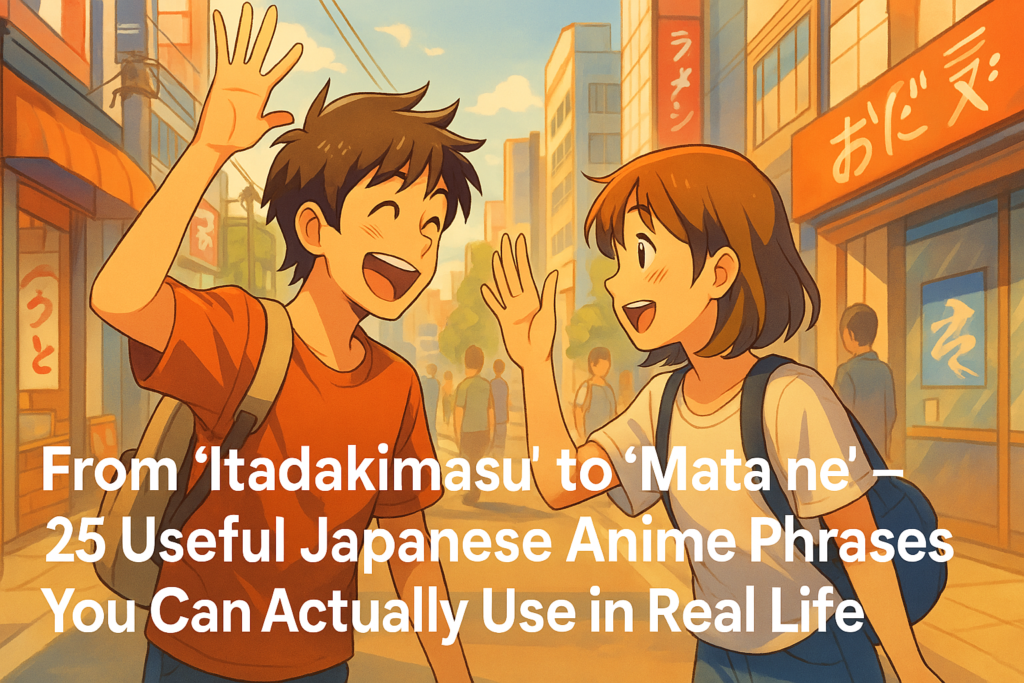Have you ever dreamed of confidently speaking Japanese phrases you’ve heard in your favorite anime? While not every dramatic line from Attack on Titan or My Hero Academia works in everyday situations, many Japanese anime phrases are perfectly suitable for real-life conversations in Japan.
Whether you’re planning a trip to Tokyo, studying Japanese, or simply want to impress your anime-loving friends, this guide will help you understand which anime expressions are appropriate to use and when to use them.
Why Japanese Anime Phrases Are Worth Learning
Anime serves as an excellent gateway to Japanese language learning. The casual dialogue, cultural context, and emotional expressions provide a more engaging learning experience than traditional textbooks.
When you learn Japanese anime phrases, you’re not just memorizing words—you’re absorbing how native speakers naturally express themselves in different situations. This immersive approach helps you develop a more authentic speaking style and cultural understanding.
Common Greetings from Anime You Can Use Daily
These everyday greetings appear in virtually every anime and are essential for daily communication:
- おはようございます (Ohayōgozaimasu) – Good morning
- こんにちは (Konnichiwa) – Hello/Good afternoon
- こんばんは (Konbanwa) – Good evening
- さようなら (Sayōnara) – Goodbye (formal)
- またね (Mata ne) – See you later (casual)
- じゃあね (Jaa ne) – See you (very casual)
Pro Tip: While “さようなら” (Sayōnara) is commonly taught as “goodbye,” it has a sense of long-term parting. For everyday goodbyes, Japanese people typically use “またね” (Mata ne) or “じゃあね” (Jaa ne).
Essential Japanese Anime Phrases for Daily Life
These phrases from anime have practical applications in real-world situations:
Home Life Phrases
- いただきます (Itadakimasu) – Said before eating (expressing gratitude for the meal)
- ごちそうさまでした (Gochisousama deshita) – Said after finishing a meal (thanking for the food)
- ただいま (Tadaima) – I’m home
- おかえり(なさい) (Okaeri(nasai)) – Welcome back
- 行ってきます (Ittekimasu) – I’m leaving/I’ll be back
- 行ってらっしゃい (Itterasshai) – Take care/Come back safely
Want to explore Japan’s culture?
Discover Japan’s rich culture, traditions, and hidden gems with our expertly crafted guides. Get insider tips on travel, food, and history. All for free!
Polite Expressions
- すみません (Sumimasen) – Excuse me/I’m sorry (multipurpose phrase)
- ありがとうございます (Arigatou gozaimasu) – Thank you very much
- どういたしまして (Douitashimashite) – You’re welcome
- お願いします (Onegaishimasu) – Please (when requesting something)
If you’re looking to expand your Japanese language skills beyond these basic phrases, check out our comprehensive Japanese learning guides where you can download free resources to accelerate your progress.
Common Reactions and Expressions from Anime
These expressive phrases will help you sound more natural in conversations:
- すごい (Sugoi) – Amazing/Wow
- かわいい (Kawaii) – Cute
- かっこいい (Kakkoii) – Cool
- 大丈夫 (Daijoubu) – It’s okay/I’m fine
- よかった (Yokatta) – That’s good/What a relief
- しょうがない (Shouganai) – It can’t be helped
For example, when someone shows you their new gadget, a simple “すごい!” (Sugoi!) with genuine enthusiasm is perfectly appropriate and natural.
Japanese Anime Phrases to Avoid in Public
While watching anime, you’ll hear phrases that sound cool but should be avoided in real-life situations:
- お前 (Omae) – You (rude)
- うるさい (Urusai) – Shut up/You’re annoying
- 馬鹿 (Baka) – Stupid/Idiot
- 死ね (Shine) – Die (extremely offensive)
These expressions are often used for dramatic effect in anime but can be considered rude or even offensive in actual Japanese conversation. As our article on how to say help in Japanese explains, understanding the social context of phrases is crucial.
Tips for Using Japanese Anime Phrases Correctly
- Consider the context: What works in a high school anime setting might not work in a professional environment.
- Respect formality levels: Use polite forms (-です/-ます) with strangers and in formal settings.
- Watch your tone: Avoid the exaggerated pronunciation common in anime.
- Start with basics: Master simple greetings before attempting complex expressions.
- Listen to native speakers: Pay attention to how real Japanese people use these phrases.
Q&A: Common Questions About Japanese Anime Phrases
Are Japanese phrases from anime useful for real conversations?
Yes, many Japanese anime phrases are used in everyday conversation. Basic greetings, reactions, and household expressions from anime can be very practical when speaking Japanese in real life.
What is the most useful Japanese phrase from anime?
“すみません” (Sumimasen) is arguably the most useful Japanese phrase from anime. It functions as “excuse me,” “I’m sorry,” and “thank you” depending on the context, making it extremely versatile in daily situations.
Should I learn Japanese through anime alone?
While anime can supplement your Japanese learning, it shouldn’t be your only resource. Combine it with structured learning materials, practice with native speakers, and other authentic media for a balanced approach.
Which anime is best for Japanese language learners?
Slice-of-life anime like “Nichijou,” “K-On!” and “Barakamon” feature everyday conversations and situations, making them excellent for language learners. They showcase natural dialogue in realistic settings.
Conclusion
Japanese anime phrases can be a fun and effective gateway to learning practical Japanese. By focusing on commonly used expressions and understanding their appropriate contexts, you can enhance your Japanese communication skills while enjoying your favorite shows.
Remember that learning a language is a journey—start with these basic phrases, practice regularly, and gradually expand your vocabulary. Before you know it, you’ll be expressing yourself naturally in Japanese, both in and outside the anime world.
For more helpful Japanese language resources, be sure to explore our articles on Japanese onomatopoeia and understanding the water kanji, which will further enhance your Japanese language skills.
Love Japan? Stay in the Loop!
Get the best of Japan straight to your inbox: language, culture & travel insights!




